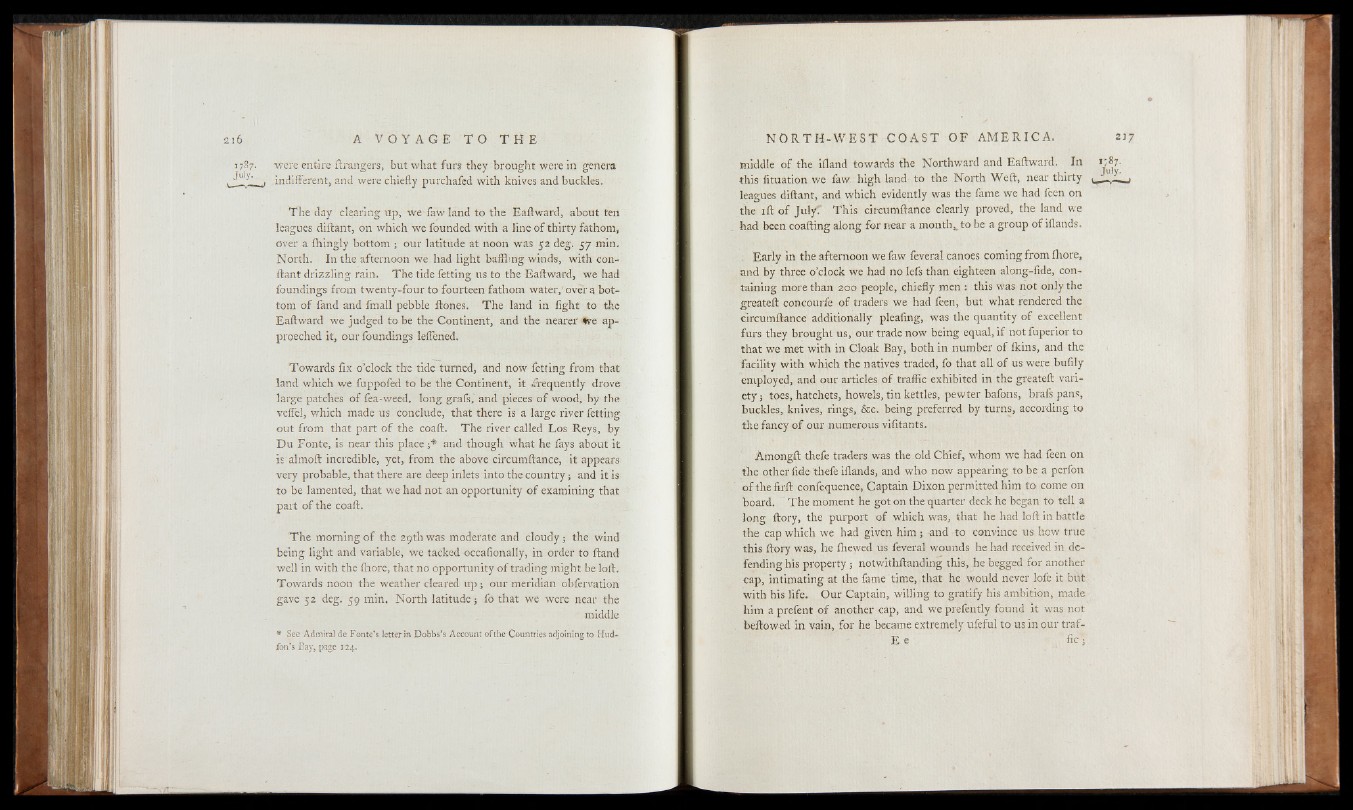
were entire Grangers, but what furs they brought were in genera
indifferent, and were chiefly purchafed with knives and buckles.
The day clearing up, we faw land to the Eaftward, about ten
leagues diftant, on which we founded with a line of thirty fathom,
over a fhingly bottom ; our latitude at noon was 52 deg. 57 min.
North. In the afternoon we had light baffling winds, with con-
ft ant drizzling rain. The tide fetting us to the Eaftward, we had
foundings from twenty-four to fourteen fathom water,1 over a bottom
of fand and fmall pebble ftones. The land in fight to the
Eaftward we judged to be the Continent, and the nearer We ap-
proeched it, our foundings leflened.
Towards fix o’clock the tide turned, and now fetting from that
land which we fuppofed to be the Continent, it «frequently drove
large patches of fea-weed, long grafs, and pieces of wood, by the
veflel, which made us conclude, that there is a large river fetting
out from that part of the coaft. The river called Los Reys, by
Du Fonte, is near this place ;* and though what he fays about it
is almoft incredible, yet, from the above circumftance, it appears
very probable, that there are deep inlets into the country; and it is
to be lamented, that we had not an opportunity of examining that
part of the coaft.
The morning of the 29th was moderate and cloudy; the wind
being light and variable, we tacked occafionally, in order to ftand
well in with the fhore, that no opportunity of trading might be loft.
Towards noon the weather cleared up 3 our meridian obfervation
gave 52 deg. 59 min. North latitude; fo that we were near the
middle
* See Admiral de Fonte’s letter in Dobbs’s Account of the Countries adjoining to Hud-
Ion’s Lay, page 124.
middle of the ifland towards the Northward and Eaftward. In
this lituation we faw high land to the North Weft, near thirty
leagues diftant, and which evidently was the fame we had feen on
the ift of Julyf This circumftance clearly proved, the land we
had been coafting along for near a month,, to be a group of iflands.
Early in the afternoon we faw feveral canoes coming from Ihore,
and by three o’clock we had no Iefs than eighteen along-fide, containing
more than 200 people, chiefly men ; this was not only the
greateft concourfe of traders we had feen, but what rendered the
circumftance additionally pleaiing, was the quantity of excellent
furs they brought us, our trade now being equal, if notfuperior to
that we met with in Cloak Bay, both in number of ikins, and the
Facility with which the natives traded, fo that all of us were bufily
employed, and our articles of traffic exhibited in the greateft variety
; toes, hatchets, howels, tin kettles, pewter bafons, brafs pans,
buckles, knives, rings, &c, being preferred by turns, according to
the fancy o f our numerous vifitants.
Amongft thefe traders was the old Chief, whom we had feen on
the other fide thefe iflands, and who now appearing to be a perfon
of the firft confequence, Captain Dixon permitted him to come on
board. The moment he got on the quarter deck he began to tell a
long ftory, the purport of which was, that he had loft in battle
the cap which we had given him3 and to convince us how true
this ftory was, he fhewed us feveral wounds he had received in defending
his property ; notwithftanding this, he begged for another
cap, intimating at the fame time, that he would never lofe it but
with his life. Our Captain, willing to gratify his ambition, made
him a prefent of another cap, and we prefently found it was not
bellowed in vain, for he became extremely ufeful to us in our traf-
E e fic 3
1787.
July